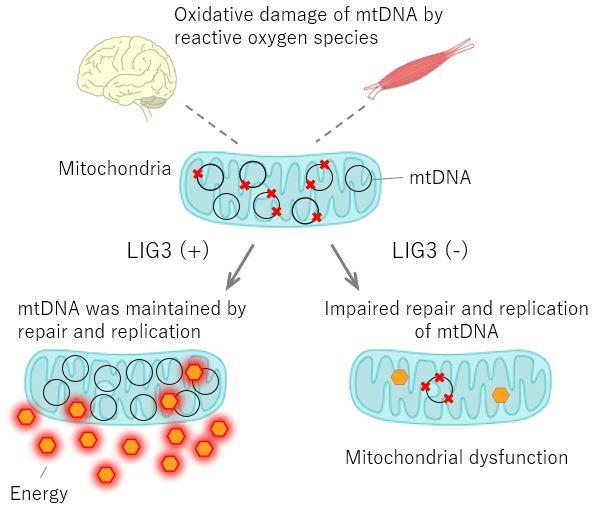DNA ligase proteins, which facilitate the formation of bonds between separate strands of DNA, play critical roles in the replication and maintenance of DNA. The human genome encodes three different DNA ligase proteins, but only one of them—DNA ligase III (LIG3)—is expressed in mitochondria. LIG3 is therefore crucial for mitochondrial health, and inactivation of the homologous protein in mice causes profound mitochondrial dysfunction and early embryonic mortality.
In an article recently published in the peer-reviewed journal Brain, a team of European and Japanese scientists led by Dr. Mariko Taniguchi-Ikeda from Fujita Health University Hospital describes a set of seven patients with a novel mitochondrial disorder caused by biallelic variants in the gene that encodes the LIG3 protein, known as the LIG3 gene. Their report provides a description of the patients’ symptoms and a mechanistic exploration of the mutations’ effects.
For Dr. Taniguchi-Ikeda, the investigation began with her desire to help a young patient. “I wanted to make a distinct clinical and genetic diagnosis for the affected patient,” she explains, “because his elder brother had passed away and the surviving boy was referred to my outpatient ward for detailed genetic tests.” By performing whole-exome sequencing of DNA from the surviving patient, Dr. Taniguchi-Ikeda discovered that he had inherited a p.P609L LIG3 variant from his father and a p.R811Ter LIG3 variant from his mother. The parents had kept the deceased brother’s dried umbilical cord, and by analyzing DNA extracted from that source, Dr. Taniguchi-Ikeda confirmed that the brother had carried the same LIG3 variants.
Having detected a novel genetic mitochondrial disorder, Dr. Taniguchi-Ikeda wished to conduct further research by identifying other patients with pathogenic LIG3 variants. She could find no other such cases in Japan, but through a collaboration with Dr. Makiko Tsutsumi from Fujita Health University and researchers in Europe, including Professor Elena Bonora from the University of Bologna and Professor Roberto De Giorgio from the University of Ferrara, she learned of two European families also affected by such variants. One was an Italian family in which three brothers had all inherited a p.K537N variant from their father and a p.G964R variant from their mother, and the other was a Dutch family in which two daughters had inherited a p.R267Ter variant from their father and a p.C999Y variant from their mother.
These patients experienced a complex syndrome involving severe gut dysmotility and neurologic abnormalities as the most consistently observed clinical signs. The neurologic abnormalities included leukoencephalopathy, epilepsy, migraine, stroke-like episodes, and neurogenic bladder. The prominent changes in the gut were decreased myenteric neuron counts and elevated fibrosis and elastin levels. Muscle pathology assessments revealed decreased staining intensities for cytochrome C oxidase.
To better characterize how the patients’ LIG3 mutations could lead to such phenotypes, the researchers conducted experiments both in vitro and on zebrafish. The in vitro experiments with patient-derived fibroblasts showed that the mutations resulted in reduced LIG3 protein levels and diminished ligase activity. The consequent deficits in mitochondrial DNA maintenance would do much to explain the patients’ presentations. Experiments with zebrafish showed that disrupting the lig3 gene produced brain alterations and gut transit impairments analogous to those observed in the patients.
The study brings to light a novel disorder resulting from disruption of a gene that plays a critical role in the maintenance of mitochondrial DNA. In describing the importance of these findings, Dr. Taniguchi-Ikeda concludes, “Our study may facilitate efforts to diagnose patients with mitochondrial diseases. Our findings will also be beneficial to future investigations into the mitochondrial DNA repair system.”
Cholesterol accumulation contributes to genetic movement disorder
More information:
Biallelic variants in LIG3 cause a novel mitochondrial neurogastrointestinal encephalomyopathy. Brain (2021). DOI: 10.1093/brain/awab056
Provided by
Fujita Health University
Citation:
Japanese-European research team discovers novel genetic mitochondrial disorder (2021, April 16)
retrieved 19 April 2021
from https://medicalxpress.com/news/2021-04-japanese-european-team-genetic-mitochondrial-disorder.html
This document is subject to copyright. Apart from any fair dealing for the purpose of private study or research, no
part may be reproduced without the written permission. The content is provided for information purposes only.



